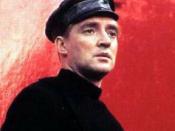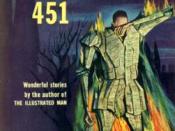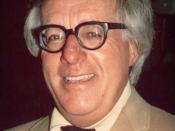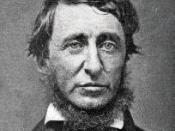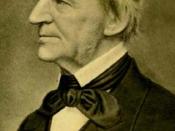Man-Thinking Project Many things are banned in society. Society bans things that help people, like in Bradbury's Fahrenheit 451 people are banned from reading books that help them think and open up their imaginations. In Orwell's Animal Farm Jones bans the animals from being free. In Rand's Anthem freedom to be what you want to be is banned. Sometimes society does not ban something sometimes a person is banned from moving like in Trumbo's Johnny Got His Gun. When things are banned in society, the individual can not use their intellect to the fullest because they are not allowed to think for themselves.
In George Orwell's Animal Farm, there is no Orwell figure, a character that experiences awareness, rejection, and flight (348). There is no single figure trying to escape from society at the farm. Snowball is a character that gets banned from society, but he does not try to run from it.
Jones feared, in the beginning of the novel, that if the animals became aware of their strength that the humans would have no control over them (348). The animals that are considered more equal than all others living on the animal farm are the pigs (348). The pigs eventually turn a society that was free into a society that is banned from thinking for themselves, just like in the days when Jones ruled.
In Ray Bradbury's novel Fahrenheit 451, the setting is the future where Guy Montag is a fireman who burns books and discourages the citizens from thinking about anything except four-wall television (41). The people are banned from even having the books in their homes. A society like this, where everyone conforms, will bring its destruction (41). Beatty and Faber are the two poles where Montag must find his identity (41). Montag begins trying to let others keep the books because he meets a lady that fights so hard for the books he thinks that they must be good for the people if someone would fight that hard for them. Beatty is not a formidable opposition for Montag; he does not strike fear into the reader (41). If man was allowed to do whatever he wanted there would be chaos, and that is what Beatty tries to prevent by burning the books in Fahrenheit 451, but he makes chaos in the process of preventing it because eventually no one will be able to think for themselves.
In Ayn Rand's novel Anthem, the moderate realist tradition is shown through Equality-72521 (68). The free market is not paternalistic so it allows for the achievement of excellence (68). Even the stone that was rejected could be the head of the corner, is like the idea of Equality-72521 because it was rejected by the scholars (69). The reason it was rejected is because Equality-72521 is banned from thinking because he was not a scholar he was chosen to be a street sweeper. Universal concepts go along with many concepts of this novel because concepts are universal (67).
In Ralph Waldo Emerson's essay The American Scholar, combines three influences: nature, the past, and action (221). The second sign of hope that Emerson tells about in his essay is the imaginative transformation into the matter of the soul (221). The thesis of the essay is hoping that the scholar is man-thinking (220). The final hopeful sign of democracy which does not empower the individual (220). This list of hopeful signs for the future is where he ends his address (221).
In Henry David Thoreau's essay Civil disobedience, he states that the problem with man in society is the problem of voluntary adjustment (375). All comfortable compromises swept away with individualism translated into politics (375). Political expediency and the law of morality often clash (375). This is where things often get thrown out and banned from society. The government only has control of what you concede to (375). The fundamental law is the law of morality (375).
In the 1960's music and musicians were investigated and banned by the government for obscene messages, Christian and non-Christian statements, and even for talking about racism. Like in Jimi Hendrix's song "How Would You Feel,"ÃÂ this song stuck up for the blacks and the racism that was going on in America at the time. Catholic children were banned from dancing to the song "The Twist"ÃÂ because it was un-Christian. Burning of Beatles records and protests against the Beatles came about because of John Lennon's comment "We're more popular than Jesus now."ÃÂ "The Ballad of John and Yoko"ÃÂ is banned from some of the countries top radio stations because of references to Christ and crucifixion. The Barry McGuire song "Eve of Destruction"ÃÂ was banned from stores and radian stations because of it's nihilistic lyrics that promoted suicide. Because of the Doors anti-war theme in their song "The Unknown Soldier"ÃÂ it was banned form airplay.
Music of the 1960's was also banned for sexually explicit lyrics and even for the lyrics being indecipherable. In Indiana the governor attempted to ban the hit by the Kingsmen "Louie, Louie"ÃÂ because the lyrics could not be understood. In El Paso, Texas Bob Dylan songs were banned because the lyrics were not understandable. The Rolling Stones hit "I Can't Get No Satisfaction"ÃÂ was banned across the country because of sexually suggestive lyrics. MGM Records, because of sexual lyrics, altered the Frank Zappa song "Money"ÃÂ. Because of the references of teenage pregnancy and premarital sex Van Morrison's "Brown Eyed Girl"ÃÂ was banned and Morrison had to cut an alternate version with acceptable lyrics.
All these novels share something in common, and that is pushing man to think for himself. Society needs to let people think for themselves instead of banning everything, let the individual open their minds to new things. Man needs to strive for excellence and be a man thinker, and always have individuality in the thinking of the individual.

